U.S. Surrogacy Laws By State
ConceiveAbilities is your trusted resource for all things surrogacy including guidance through the legal process. Surrogacy laws vary from state to state and even sometimes county to county. That is why, in addition to our own internal team of expert attorneys, ConceiveAbilities partners with local, state specific attorneys who specialize in reproductive law. Surrogacy laws are ever-changing, but we are here to ensure you feel informed, comfortable, and assured as you proceed forward with the legal process.

Below is a brief overview of the current laws impacting surrogacy in relevant states. We are always here to provide additional information and answer your questions so that you can feel confident from the legal perspective as you embark on a surrogacy journey with ConceiveAbilities.
Illinois
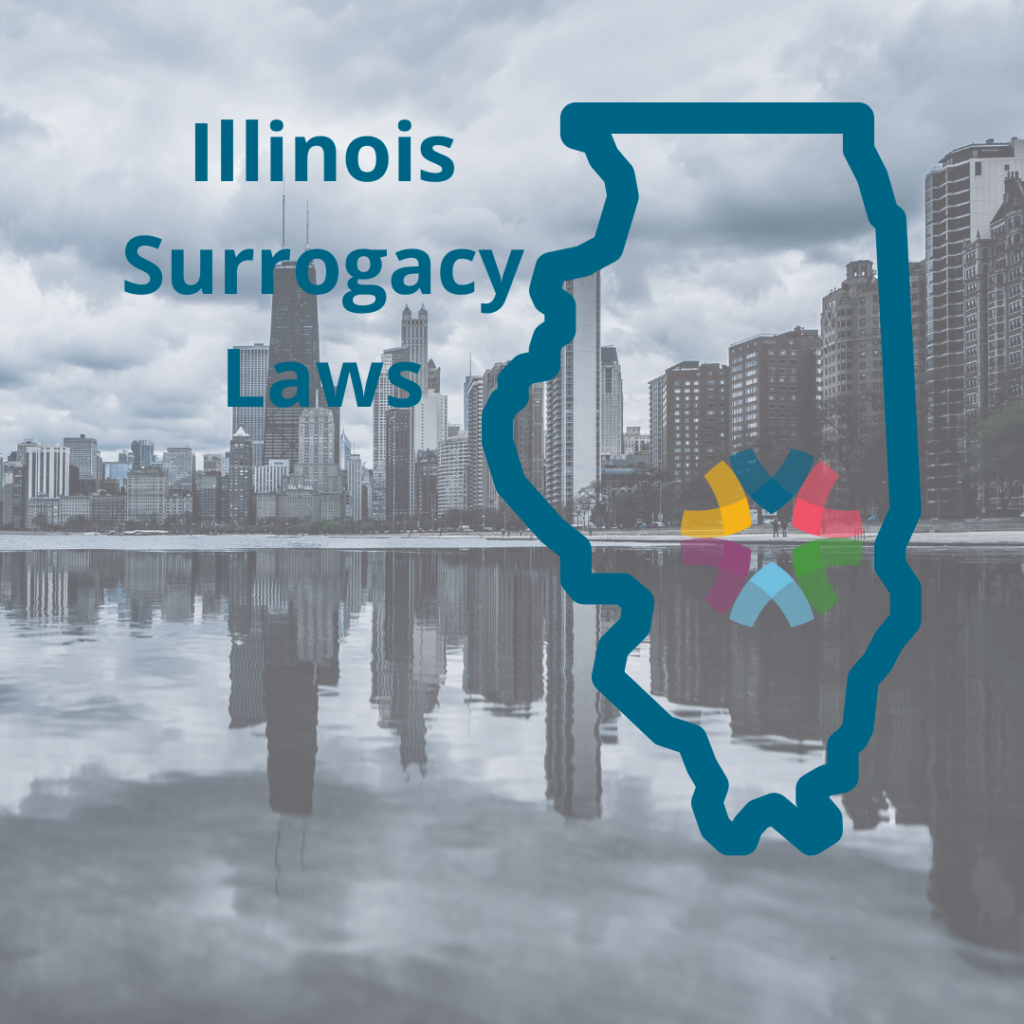
Illinois is ConceiveAbilities’ home base! In Illinois, gestational surrogacy is permitted via statute and allows intended parents(s) to be declared the legal parent(s) upon birth of the child as long as one intended parent is a genetic contributor to the child. As such, legal parentage is determined upon birth and intended parents can obtain a birth certificate from vital statistics directly. If the statute’s requirements are not met, or if a court order is needed for other reasons, then parentage may be determined via a post-birth order. Finally, if both egg donor and sperm donor are used, parental rights would be obtained via an adoption proceeding.
Get more information about surrogacy in Illinois.
New York
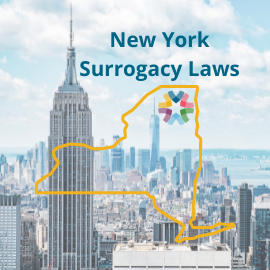
As of February 15, 2021, compensated gestational surrogacy was made legal in New York via its new statute: the Child Parent Security Act (CPSA). The CPSA includes the Surrogate’s Bill of Rights–the first of its kind in the industry–as well as many requirements for the gestational carrier agreements. You can learn more about the CPSA and its impact on the surrogacy industry here.
Notably, ConceiveAbilities was one of the first surrogacy agencies to be licensed by the New York Department of Health. To comply with the CPSA, ConceiveAbilities ensures that its intended parents and gestational carriers have experienced, well-versed reproductive attorneys who are knowledgeable of the CPSA. Under the CPSA, New York courts will grant pre-birth orders for all intended parents regardless of genetic contributors, marital status, or sexual orientation who are parties to a compensated surrogacy arrangement; and the order will go into effect at the time of the birth.
Get more information about surrogacy in New York.
Colorado
Gestational surrogacy is legal in Colorado via the Colorado Surrogacy Agreement Act. The law protects both the intended parents and the gestational carrier who have entered into gestational carrier agreements consistent with the law. ConceiveAbilities ensures that during the drafting of the gestational carrier agreement all parties are represented by attorneys licensed in Colorado as is required by the law. Intended parents can proceed with a gestational carrier in Colorado regardless of their marital status, sexual orientation, genetic connection, or need for surrogacy. Parentage can be determined via a pre-birth order from the juvenile court and said order will vest the intended parents with all parental rights and duties to the child immediately upon birth.
Get more information about surrogacy in Colorado.
California
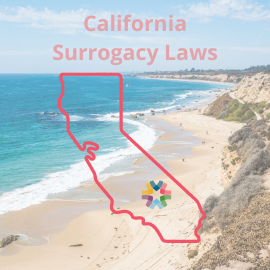
California is often thought of as the “friendliest” state for surrogacy and for good reason—California was the first state to enact a statute that makes surrogacy available to all! And while there are other states that are similarly as supportive and legally secure, California remains one of the most sought after states for surrogacy. Intended Parents, regardless of marital status, sexual orientation, genetic connection, or medical need for surrogacy, can obtain a pre-birth order. This is true so long as any portion of the surrogacy occurred in California–specifically: (1) the county where the child is anticipated to be born, (2) the county where the intended parent(s) reside, (3) the county where the gestational carrier resides, (4) the county where the assisted reproduction agreement for gestational carrier is executed, or (5) the county where medical procedures pursuant to the GCA (i.e. embryo transfers) are to be performed. The pre-birth order becomes effective at the moment of birth.
Get more information about surrogacy in Southern California and Northern California
Oregon
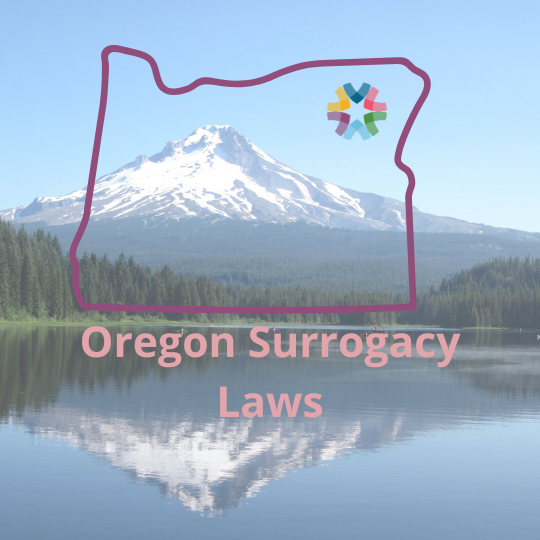
Although there are no specific surrogacy laws in Oregon, there are laws that contemplate the relationship between the intended parent(s) and a child conceived via assisted reproductive technology. Furthermore, there are no specific statutes or case law that prohibit surrogacy. Surrogacy is safely practiced in Oregon and is available to any and all types of intended parents who will legally be declared the parents of the child. Most judges issue pre-birth orders if there is a genetic connection between the intended parent(s) and child and in some cases even when there is not a genetic connection. Post-birth orders are also available if needed.
Get more information about surrogacy in Oregon.
Washington
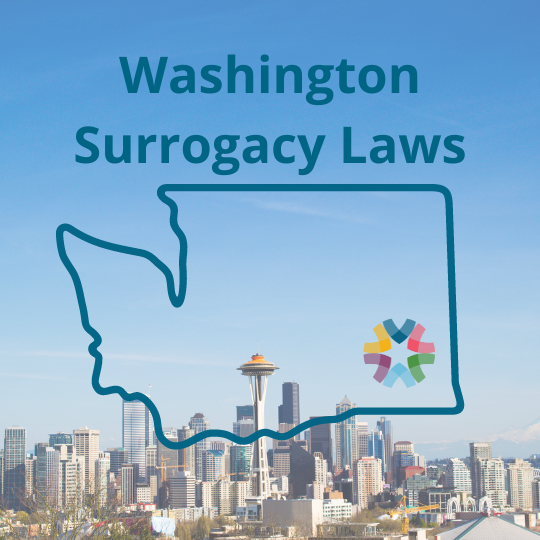
Rounding out the surrogacy friendly states of the west coast is Washington. As of January 1, 2019, Washington enacted a parentage statute that provides for enforceable gestational carrier agreements and pre-birth orders. Pre-birth orders are granted regardless of the intended parent(s) marital status, sexual preference, genetic connection, or medical need for surrogacy. Pre-birth orders go into effect upon the birth of the child. Washington law defines who can be a “gestational surrogate” and provides specific details as to what terms need to be included in the gestational carrier for it to be enforceable. Specifically, a gestational carrier may not have completed more than two (2) surrogacies.Therefore, for all parties’ protection, it is critical that intended parents and gestational carriers work with experienced surrogacy professionals, like those at ConceiveAbilities, who are well versed in the specific requirements in Washington.
Get more information about surrogacy in Washington.
Minnesota
Gestational surrogacy is practiced in Minnesota as no statute or published case law prohibits surrogacy. Surrogacy is available to Intended Parents regardless of marital status or genetic connection. Although many courts in several counties will grant pre-birth declaratory judgments, the more likely course of action is that parentage will be determined post-birth, especially if donor material was used. The relevant paperwork can be filed pre-birth, but it will not be granted until after birth. Additionally, a hearing is oftentimes required by the presiding judge meaning that all parties should anticipate remaining in Minnesota until the necessary legal work is completed.
Arguably the most notable aspect of surrogacy in Minnesota is that if a judge will not sign a pre-birth declaratory judgment, a non-genetic parent will need to obtain a second parent adoption post-birth to confer parental rights. While the optics of this is not ideal, as it is the intended parents’ child, it is a critical step to ensure that all intended parents have equal legal rights to their child. The second parent adoption is typically completed quickly after birth in conjunction with the other post-birth legal proceedings in order to ensure both parents are named on the birth certificate.
Get more information about surrogacy in Minnesota.
Massachusetts
Gestational surrogacy is supported in Massachusetts by three notable cases decided by the Commonwealth’s superior Court – Hodas v. Morin (2004); Culliton v. Beth Israel Deaconess Med. Ctr. (2002); and R.R. v. M.H. (1998). Married and unmarried couples and single individuals, regardless of sexual orientation and/or genetic connection, may obtain a pre-birth order. A hearing is typically not required but is ultimately up to the judge’s discretion.
Get more information about surrogacy in Massachusetts.
Nevada
Not to be outdone by its neighboring state of California, Nevada also has a surrogacy statute that permits gestational surrogacy for all intended parents regardless of marital status, sexual orientation, genetic connection, or medical need. Pre-birth and post-birth orders are available. The Nevada statute specifically provides that parties may enter into gestational carrier agreements which contemplate payment of consideration for surrogacy services. The statute also requires that the gestational carrier agreement expressly state that the gestational carrier and her legal spouse/partner relinquish all rights and duties to the child conceived through assisted reproduction and that it is the intended parent(s) who are the parents of any resulting child. While the gestational carrier agreement would already state this regardless of the prevailing state law, Nevada has appropriately made this a statutory requirement for any gestational carrier agreement. Way to go Nevada!
Get more information about surrogacy in Nevada.
Pennsylvania
Although there is no surrogacy statute in Pennsylvania, gestational surrogacy is still permitted and practiced. Pennsylvania declared in a 2006 case that a surrogacy contract is not contrary to public policy and that the gestational carrier is not the “legal mother.” Furthermore, in 2015, the Superior Court confirmed the enforceability of gestational carrier agreements as well as intended parents legal parentage to the child regardless of any genetic connection. Pre-birth orders are available, although this sometimes varies based on the specific county and judge, particularly if donor material is used. However, thanks to these court decisions, parties can safely proceed with gestational surrogacy in Pennsylvania.
Get more information about surrogacy in Pennsylvania.
Maryland
Maryland has been a favorable state for gestational surrogacy since 2003. Similar to other states, parties are able to safely practice gestational surrogacy thanks to a favorable court decision (as compared to an explicit statute). Maryland’s highest court implicitly approved gestational surrogacy by determining that a gestational carrier is not required to be listed as the “mother” on the birth certificate of the child thereby leading to having the intended parents exclusively listed. Regardless of marital status, sexual orientation, or genetic connection, Intended Parents are able to establish their parental rights pre-birth.
Get more information about surrogacy in Maryland.
Georgia
Despite no statutory or case law directly addressing surrogacy contracts in Georgia, it is a favorable state for gestational surrogacy. Courts regularly establish parental rights for Intended Parents through a pre-birth declaratory judgment regardless of sexual orientation, marital status, or genetic connection (although there may be additional paperwork required). The court process is typically very seamless – everything is usually handled directly between attorneys and usually no in-person hearing is required, but this can vary by judge.
Get more information about surrogacy in Georgia.
Virginia
Many are surprised to learn that surrogacy is authorized by statute in Virginia. Virginia’s “Status of Children of Assisted Conception” is unique because although it contemplates court approval process, this can only be done prior to embryo transfer and is not a pre-birth parentage order. It is instead a lengthy court process more akin to an adoption proceeding–home studies for all parties, the appointment of a guardian ad litem for the unborn child, and a full trial-like court hearing. Therefore, almost all Intended Parents bypass this and opt to establish their parental rights post-birth either through the administrative process contemplated in the statute or an order of parentage from the court. One other unique note for Virginia, the gestational carrier cannot sign any of the documents until 72 hours after the child is born. Finally, Virginia has a marital requirement for couples pursuing gestational surrogacy, but there need not be any genetic connection so long as ownership of the embryo can be proven.
Ohio
As of 2007, the Ohio Supreme Court has confirmed that gestational surrogacy is not against public policy and therefore gestational surrogacy is readily practiced in Ohio. While pre-birth orders are granted, they are discretionary meaning they are somewhat variable depending on the county. However, most counties will issue a pre-birth order for married Intended Parents, unmarried heterosexual couples, or singles regardless of sexual orientation or genetics. If not possible, Intended Parents can obtain a post-birth order to secure their parental rights.
Get more information about surrogacy in Ohio.
North Carolina
Gestational surrogacy is practiced in North Carolina as there is no prohibition of it by either case law or statute. While most intended parents are able to obtain a pre-birth parentage, in some rare occasions parentage may be determined post-birth. The biggest factor is the intended parents’ marital status and genetic connection to the child. One specificity as to North Carolina gestational surrogacy is that when a known donor is used, the donor will also to be a party to the parentage legal proceedings. Nevertheless, single genetic parents, married and unmarried heterosexual couples with at least one genetic parent, and married same-sex couples with one genetic parent traditionally have no issue obtaining pre-birth orders as a matter of course.
Get more information about surrogacy in North Carolina.
Alabama
Alabama courts regularly recognize gestational surrogacy and establish parental rights for married couples and single Intended Parents regardless of genetic connection. More often than not, Intended Parents may obtain a pre-birth declaratory judgment; in cases where that is not allowed (based on the county), Intended Parents may obtain a pre-birth consent which becomes effective five days after delivery of the child. Ultimately, a post birth order may be necessary.
Get more information about surrogacy in Alabama.
Florida
In Florida, gestational surrogacy is permitted by statute (Ch.742.15 FL Stat.) but only for married couples. However, surrogacy is still available to unmarried and single Intended Parents in Florida via court orders so long as one Intended Parent has a genetic connection. Although technically providing pre-birth orders, Florida is unique in that the pre-birth orders act more as interim orders for medical decisions and paternity. A post birth order must be obtained before a birth certificate containing the Intended Parents’ names will be issued. Florida also has a strict medical need requirement with the statute providing specific medical requirements such as the Intended Mother is not able to physically gestate a pregnancy to term.
Get more information about surrogacy in Florida.
New Jersey
In 2018, the Gestational Carrier Agreement Act went into effect in New Jersey. The Act provided for enforceable gestational carrier agreements and pre-birth orders for all types of Intended Parents in accordance with specific conditions. For example, the gestational carrier agreement must be in writing, all parties must have completed mental health evaluations, and independent legal representation must have been provided for the gestational carrier and Intended Parents. These requirements and protections make New Jersey a very surrogacy friendly state.
Get more information about surrogacy in New Jersey.
Texas
By statute, Texas permits gestational surrogacy for married intended parents (Tex. Fam. Code Ann. § 160.752, § 160.753, § 160.754). Under the law, the “gestational agreement” (aka GCA) must be validated by the court to be enforceable and confer parental rights. If the parties have a validated gestational carrier agreement, married Intended Parents may obtain a pre-birth order. For Intended Parents who are not married, or those who are single, judges have the discretion to grant pre-birth orders. The Texas statute also contemplates the option of a post-birth order. Regardless of pre-birth or post-birth, there must be a genetic connection between the IPs and the child. For unmarried IPs, the non-genetic parent would need to complete a second parent adoption. One unique aspect of the Texas law is that the gestational carrier agreement needs to be validated to be enforceable.
Get more information about surrogacy in Texas.
Wisconsin
Wisconsin’s Supreme Court ruled in the 2013 case of Paternity of F.T.R., Rosecky v. Schissel that surrogacy contracts are enforceable so long as they are not contrary to the best interests of the child. Typically, intended parents, regardless of marital status, can obtain parentage orders placing their names on the birth certificate so long as one parent is genetically related to the child. If neither intended parent is genetically related to the child, a parentage order may be granted but this will depend on the particular county and judge. Additionally, while parentage orders are often issued pre-birth, they are considered “interim” orders and require a subsequent, final order issued after the child’s birth to facilitate obtaining the birth certificate. Finally, in many cases a hearing is required where all parties may be expected to appear.
Get more information about surrogacy in Wisconsin.
Connecticut
The Connecticut Parentage Act (CPA) provides a protected path to parentage for any intended parents pursuing gestational surrogacy. The CPA ensures that all Connecticut children – regardless of the circumstances of their birth or the marital status, gender, or sexual orientation of their parents – have equal access to the security of a legal parent-child relationship. Furthermore, Connecticut has a statute that requires Vital Records to comply with court orders in issuing a birth certificate naming the intended parents in a gestational surrogacy arrangement as the parents. Parentage orders are granted pre-birth, but an in-person healing with all parties (intended parents, gestational carrier, and gestational carrier spouse) tends to be required.
Get more information about surrogacy in Connecticut.
Indiana
At first blush, Indiana may not seem like an ideal state for surrogacy as there is a statute that voids gestational carrier agreements. However, Indiana attorneys advise that said statute only applies to traditional surrogacy (where the surrogate is genetically related to the child), not gestational surrogacy. For added protection, gestational carrier agreements, where the gestational carrier resides in Indiana will likely be drafted using the state law where the Intended Parents or fertility clinic are located. Nonetheless, gestational surrogacy is widely practiced in Indiana and courts regularly grant parental rights via pre and post birth parentage orders to married Intended Parents who have some genetic connection to the child. Single intended parents may also obtain a pre-birth order if genetically related to the child, but this can vary by judge.
Get more information about surrogacy in Indiana.
Washington, D.C.
Our nation’s capital has an express surrogacy statute. DC statutes (DC Law §§ 16-401 – 16-412) provide that all Intended Parents can obtain pre-birth orders establishing their parentage regardless of genetic connection, marital status, sexual orientation or need for surrogacy. Said orders do not become effective until the moment of birth and either the intended parents or gestational carrier need to have resided in DC for at least one (1) year. If neither party meets the residency requirement, a post-birth order can be obtained.
Get more information about surrogacy in Washington, DC.
Alaska
With no case law or statute prohibiting surrogacy, gestational surrogacy is permitted and practiced in Alaska. It is generally anticipated that courts will establish parentage pre-birth for intended parents regardless of sexual orientation, marital status, or genetic link to the expected child, but due to limited surrogacy matters in the area, it is best pursued by heterosexual parents who are married using embryos with their own genetics. A hearing is most likely required and all parties may be ordered to appear with most cases being filed and heard in Anchorage.
Arizona
Gestational surrogacy is practiced in Arizona pursuant to a 1994 appellate court decision (Soos v. Superior Court) and courts acknowledge certain parental rights via court order. Some courts will allow pre-birth orders, but many courts wait until after the birth of the child before entering a maternity order. An intended father who is the biological contributor can be listed on the birth certificate without any order through the use of a paternity affidavit in conjunction with a denial of paternity affidavit by the gestational carrier’s husband if the gestational carrier is married.
Notably, surrogacy contracts are unenforceable and prohibited by statute (Arizona Revised Statute § 25-218). So how do the parties lay out the terms of their agreement? Most commonly, in lieu of Arizona law, the prevailing law of the gestational carrier agreement will be that of another state that has a connection to the surrogacy arrangement, not Arizona; this state is most commonly California. If there is a California connection to the surrogacy (e.g. one Party lives in CA or the Fertility Center is located in CA), the Parties can also bypass court proceedings in Arizona and instead obtain a court order from California. These court orders are routinely accepted by Arizona hospitals and Vital Records.
Ultimately, there are several nuances with the Arizona process which is why it is critical to work with an experienced assisted reproduction technology attorney that is knowledgeable of the Arizona process.
Arkansas
Surrogacy is statutorily permitted in Arkansas (Code § 9-10-201) and there is flexibility in the establishment of parental rights with married intended parents able to obtain pre-birth orders. However, unmarried intended parents who create embryos with donor material will require a second parent adoption in their home state as only the biological parent can obtain a pre-birth order. Furthermore, pursuant to the statute, vital records shall initially list the gestational carrier on the birth certificate documents and then permanently amend such records to name the intended parents as the true legal parents; even when a pre-birth order has been issued.
Delaware
Delaware may be small but it sure is mighty when it comes to surrogacy. Gestational surrogacy is permitted by statute (Delaware Code 13, § 8-801 – § 8-810) for any and all IPs regardless of sexual orientation, marital status, and genetic relationship to the child. Parentage is established pre-birth and the statute explicitly provides that the gestational carrier is “not a parent of a child born as a result of a gestational carrier arrangement” so long as specified requirements are met in the arrangement.
Hawaii
There is no existing statute or case law in Hawaii that prohibits surrogacy so it is freely practiced so long as there is a genetic connection between the intended parents and the child. If the embryo was created with the assistance of an egg or sperm donor, the non-biological parent must complete a second parent adoption either in Hawaii or their home state, in order for the child’s birth certificate to show them both as the parents. For the non-biological parent, parentage can only be established post-birth. However, a hearing for the parentage order typically requires at least the gestational carrier and her spouse, if applicable, to attend in person.
Idaho
As of July 1, 2023, Idaho Gestational Agreements Act went into effect making Idaho a favorable state for surrogacy for all intended parents regardless of marital status, sexual orientation, or genetic connection. Under the new law, the parties can file a petition to have their gestational carrier agreement validated pre-birth which in turn makes it enforceable under the statute. Upon finding that the gestational carrier agreement is valid, the court shall issue an order validating the agreement and declaring that the intended parents are/will be the parent(s) of any child born under the terms of the agreement. Then post-birth, the court will issue a validation order and an order of parentage confirming that the intended parents are the parent(s) of the child.
Iowa
Surrogacy is implicitly permitted in Iowa from a culmination of three legal premises: (1) Iowa Code provides that surrogacy agreements are exempt from Iowa’s law prohibiting the purchase or sale of an individual, (2) Iowa’s administrative code addresses the issuance of birth certificates for children born to a gestational carrier (Iowa Admin. Code r. 641-99.15(144)), and (3) the Iowa Supreme Court held in 2018 that gestational carrier agreements are enforceable and do not violate public policy or the constitutional rights of the gestational carrier or child (P.M. & C.M. v. T.B. & D.B). Furthermore, in the same case, the court stated that gestational carrier agreements “promote families by enabling infertile couples to raise their own children and help bring new life into this world through willing surrogate mothers.”
As a result of this, parentage in Iowa is established in two (2) parts. First, parentage is only to be established before birth for the biological father, resulting in a birth certificate listing the biological father with gestational carrier. Then post-birth a second order is necessary to permanently change the child’s birth certificate to list the second parent. This second order is either a parentage order for the other genetic parent or an adoption for a non-genetic parent.
Have you thought about becoming a surrogate? Learn more about our All-In Surrogate Care and Compensation Package and how it protects both parents and surrogate rights.
DISCLAIMER: The information in this blog does not constitute legal advice and should not be construed as such. The information contained is strictly for informational purposes only. ConceiveAbilities does not represent or warrant the content to be error-free.